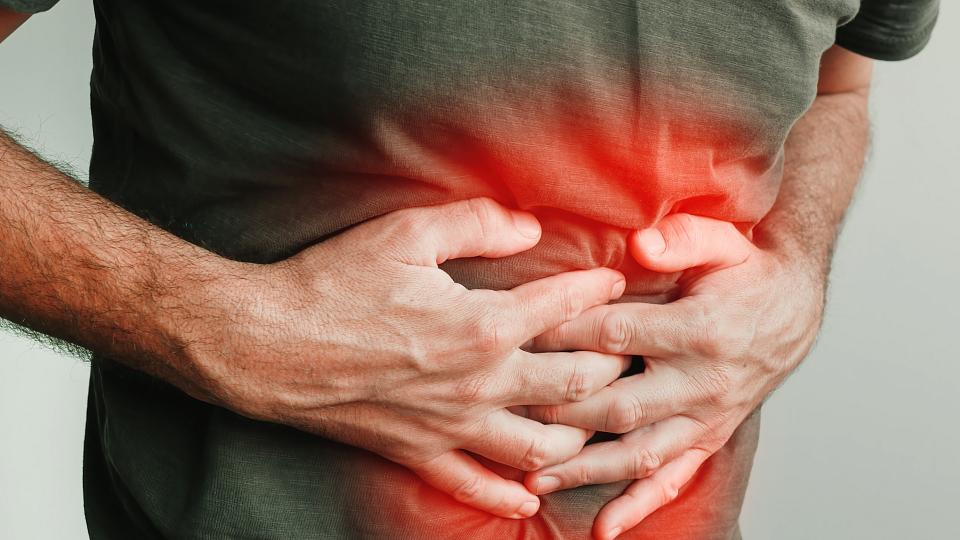
When to Visit the ER with Abdominal Pain
Causes of abdominal pain can vary. They range from the common upset stomach caused by something you ate, gastroenteritis, or acid reflux to more emergent life-threatening causes such as a gallbladder infection, ruptured ulcer, or appendicitis, among a number of other possibly life-threatening conditions. So how do you know when you should go to the emergency room (ER)?
Taylor Delgado, MD, an emergency medicine physician and adjunct professor at University of Utah Health, says that the challenge with abdominal pain is that there can be so many causes. Instead, she says, it is best to identify “red flag” symptoms that indicate a serious underlying cause of the pain. Questions she asks include:
- Is the pain so severe that it is interrupting how you can function?
- Are you having pain associated with intractable vomiting or inability to tolerate liquids?
- Are you constipated or cannot have a bowel movement and experiencing severe pain?
- Have you had abdominal surgery in the past?
- Do you have abdominal pain that seems similar to pain you have had in the past but is different in this case? Is it more severe, or is the vomiting is different?
If the answer is yes to any of these questions, an ER visit is warranted.
Delgado says that in the ER, physicians and health care professionals are simultaneously diagnosing the patient’s condition and treating symptoms. “Our job is to take a lot of the information and assemble it into an entire clinical picture of this patient to determine the best course of treatment,” she says.
Some Causes of Severe Abdominal Pain
- Kidney stones: Delgado notes that kidney stones are one of the more common causes of severe abdominal pain. In fact, according to the National Kidney Foundation, more than half a million people go to the ER for kidney stone symptoms. Delgado says kidney stone symptoms often show up first thing in the morning when people wake up a bit dehydrated and go to urinate. They will have an abrupt cramp or sharp pain in the lower abdomen that reaches maximum intensity as soon as it starts—almost like a runner’s cramp.
- Bowel obstruction: For those patients who are bloated and constipated or cannot have a bowel movement and have had abdominal surgery before, a bowel obstruction is likely the cause of pain, Delgado says.
- Acute pancreatitis: This can include pain in the upper abdomen that may begin with mild pain that worsens when you eat. The pain can become severe and constant and might include nausea, fever, and a rapid pulse.
Other causes may include irritable bowel syndrome, food poisoning, endometriosis, diverticulitis, hernia gallstones, or even an abdominal muscle strain or pull.
Appendicitis Is a Common Cause of Acute Abdominal Pain
One of the most common abdominal emergencies is appendicitis. It can occur at any age but is more common among people in their teens and twenties, according to the National Institutes of Health (NIH), and more common among males than females.
Delgado explains that appendicitis can start off slowly. “People may initially have a nagging pain in the middle of their abdomen and they're not really hungry,” she says. "Then the pain becomes progressively severe over the course of 12 to 24 hours and will often migrate down to the right lower abdomen as the appendicitis progresses.”
Delgado warns that there is no textbook presentation of symptoms with appendicitis. Children especially may have atypical symptoms of appendicitis.
According to the NIH, pain with appendicitis may:
- Begin near the belly button then move lower and to your right
- Start suddenly
- Get worse as you move, cough, sneeze, or take deep breaths
- Occur before other symptoms and worsen in a matter of hours
Other symptoms include:
- Loss of appetite
- Nausea or vomiting
- Fever
- Swelling in your abdomen
- An inability to pass gas
- Constipation or diarrhea
Many of those who visit the ER with abdominal pain will be released as the pain is caused by a virus, a gas bubble, or something the patient ate. But Delgado and others like the American College of Emergency Physicians say it is better to be safe than sorry in these instances. The American College of Emergency Physicians states, “Anyone who thinks they are having a medical emergency should not hesitate to seek care.”





